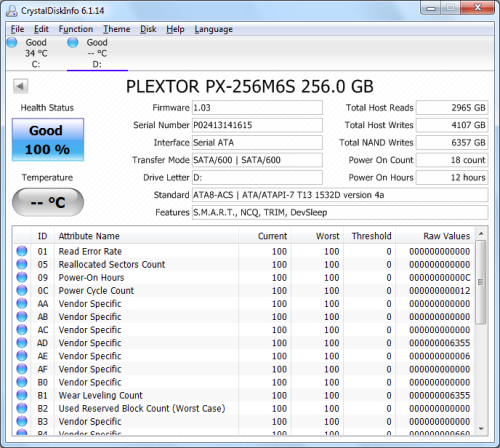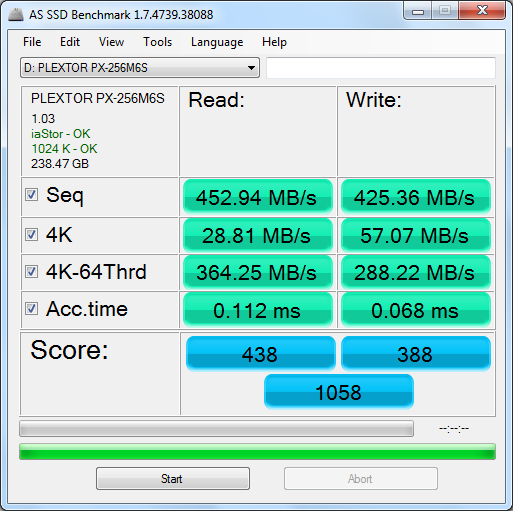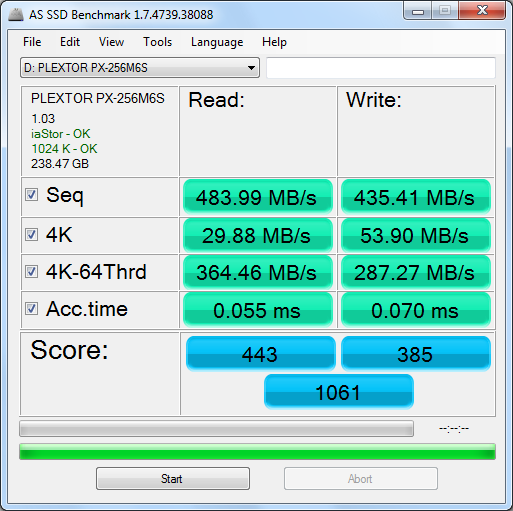TRIM and True Speed:
While SSD's offer many benefits, there are some downsides to using flash memory. One of the biggest issues people run into is performance degradation. Over time, an SSD will run out of fresh blocks and will have to write over data the file system has marked as deleted. This procedure is very complicated and can slow an SSD's write speeds considerably.
To fix this problem, most manufacturers have added TRIM support to their SSDs. The TRIM command allows an operating system, such as Windows 7, to tell an SSD which data blocks are no longer in use. Using this information, the drive pro-actively erases these blocks and adds them to the free block pool.

The M6S is the latest drive to ship with their Plextor's exclusive True Speed technology. By leveraging the power of advanced firmware, True Speed ensures that the SSD works at its full potential even after extensive use and long periods of operation. Along with support for TRIM, the M6S's firmware incorporates Instant-Restore technology and delivers advanced wear-leveling and block management.
To put the PX-256M6S into a "dirty" state, I used Iometer to fill 80% of the drive and then ran a random write test for 30 minutes. Looking at the screenshot below, you can see that the drive's average read and write speeds slowed slightly, dropping to 443.17 MB/s and 425.39 MB/s, respectively.

PX-256M6S - Dirty
I let the computer sit for about 45 minutes and then reran the test. The PX-256M6S wasn't able to reach the factory fresh performance shown in our earlier tests. However, its average read speed climbed up to 452.94 MB/s.

PX-256M6S - After TRIM
Lastly, I used Plextor's Plextool software to perform a secure erase of the PX-256M6S. With the drive wiped clean, it had average read and write speeds of 483.99 MB/s and 435.41 MB/s, respectively.

PX-256M6S - Secure Erase
Final Thoughts:
While the M6S isn't Plextor's fastest or most feature packed SSD, it's a great solution for the consumer looking to boost the performance of their existing desktop or notebook computer. Similar to what we saw with the M6M, the M6S combines Marvell's 88SS9188 "Monet Lite" controller with Toshiba's new Advanced 19nm (A19) Toggle Mode MLC NAND flash. The 88SS9188 has half the NAND flash channels as the 88SS9187 "Monet" controller found in the M5M and M5 Pro. However, thanks to a custom firmware, the M6S is still able to deliver a fast, responsive computing experience. In our sequential read and write tests, the PX-256M6S was able to read at speeds as high as 523 MB/s and write at speeds in excess of 432 MB/s. It also did reasonably well in our random write tests, producing more than 61,000 IOPS at low queue depths. Increasing the queue depth did lead to better results. However, the PX-256M6S still had a hard time keeping up with drives like the Samsung 840 EVO.
Fast read and write speeds aren't the only things the M6S has to offer. The drive features Plextor's exclusive True Speed technology, which does a pretty good job of maintaining original performance levels, even after intensive use and long periods of operation. The M6S also supports the Device Sleep (DEVSLP) standard which extends the battery life of a device by reducing the drive's power consumption when it's not in use. Last, but not least, the M6S provides 256-bit AES full disk encryption for data confidentiality.
The M6S is available now in 128GB, 256GB and 512GB capacities. Prices on Amazon.com and Newegg currently range from $80 up to $280, with the 256GB version reviewed here going for less than $140.

Highs:
- Available in 128GB, 256GB and 512GB capacities
- Good sequential read and write performance
- Performs equally well with compressible and incompressible data
- SATA 6Gb/s interface
- Toggle Mode MLC NAND flash
- Large DRAM cache
- Exclusive firmware with Instant Restore, wear-leveling and block management
- True Speed technology provides consistent performance, even after intensive usage
- 256-bit AES encryption
- DEVSLP power mode
- Supports TRIM, SMART and NCQ
- Ultra-slim form factor
- 3 year warranty
- Reasonably priced
Lows:
- Random write performance at low queue depths could be better
- Does not support TCG Opal or eDrive encryption

